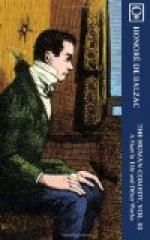But Oscar passed from peccadillo to evil feelings. He felt humiliated; he was angry with the youth he envied, and there rose in his heart a secret desire to show openly that he himself was as good as the object of his envy.
The two young fellows continued to walk up and own from the gate to the stables, and from the stables to the gate. Each time they turned they looked at Oscar curled up in his corner of the coucou. Oscar, persuaded that their jokes and laughter concerned himself, affected the utmost indifference. He began to hum the chorus of a song lately brought into vogue by the liberals, which ended with the words, “’Tis Voltaire’s fault, ’tis Rousseau’s fault.”
“Tiens! perhaps he is one of the chorus at the Opera,” said Amaury.
This exasperated Oscar, who bounded up, pulled out the wooden “back,” and called to Pierrotin:—
“When do we start?”
“Presently,” said that functionary, who was standing, whip in hand, and gazing toward the rue d’Enghien.
At this moment the scene was enlivened by the arrival of a young man accompanied by a true “gamin,” who was followed by a porter dragging a hand-cart. The young man came up to Pierrotin and spoke to him confidentially, on which the latter nodded his head, and called to his own porter. The man ran out and helped to unload the little hand-cart, which contained, besides two trunks, buckets, brushes, boxes of singular shape, and an infinity of packages and utensils which the youngest of the new-comers, who had climbed into the imperial, stowed away with such celerity that Oscar, who happened to be smiling at his mother, now standing on the other side of the street, saw none of the paraphernalia which might have revealed to him the profession of his new travelling companion.
The gamin, who must have been sixteen years of age, wore a gray blouse buckled round his waist by a polished leather belt. His cap, jauntily perched on the side of his head, seemed the sign of a merry nature, and so did the picturesque disorder of the curly brown hair which fell upon his shoulders. A black-silk cravat drew a line round his very white neck, and added to the vivacity of his bright gray eyes. The animation of his brown and rosy face, the moulding of his rather large lips, the ears detached from his head, his slightly turned-up nose, —in fact, all the details of his face proclaimed the lively spirit of a Figaro, and the careless gayety of youth, while the vivacity of his gesture and his mocking eye revealed an intellect already developed by the practice of a profession adopted very early in life. As he had already some claims to personal value, this child, made man by Art or by vocation, seemed indifferent to the question of costume; for he looked at his boots, which had not been polished, with a quizzical air, and searched for the spots on his brown Holland trousers less to remove them than to see their effect.
“I’m in style,” he said, giving himself a shake and addressing his companion.




